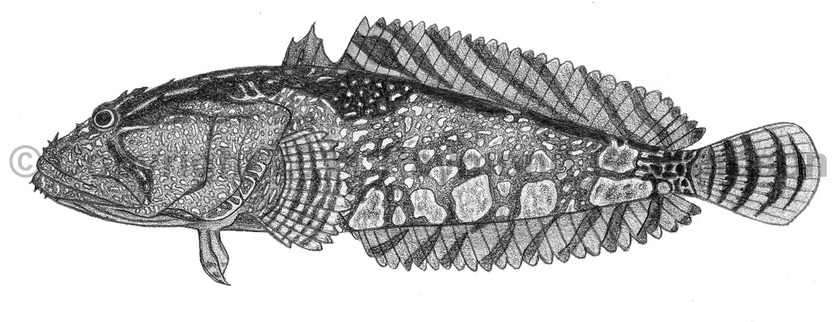
Common Name
Gulf Toadfish
Year Described
Goode & Bean, 1880
Identification
Dorsal Fin: III, 24-25
Anal Fin: 20-22
Pectoral Fin: 18-19
Pelvic Fin: I, 2
Lateral Line: 25-29 upper, 22-25 lower
Vertebrae: 10 precaudal, 23-24 caudal
Head wider, with interorbital distance greater than orbital diameter. Pectoral fin with 6-12 glands. Axillary pore present behind pectoral fin.
Color
Body light brown with irregular dark bands and large white rosette blotches towards the rear. Head usually with two bands radiating from the eye and heavily mottling/spotting. Pectoral and caudal fin pale with close-set dark bands. Dorsal and anal fins with oblique dark bands.
Size
Maximum size to 300mm SL.
Habitat
Shallow coastal waters and estuaries.
Range
S. Florida, the Bahamas, and the entire Gulf of Mexico to the Yucatan Peninsula.
References
Caires, R.A., H.A. Pichler, H.L. Spach & J.M. Ignácio, 2007. Opsanus brasiliensis Rotundo, Spinelli & Zavalla-Camin, 2005 (Teleostei: Batrachoidiformes: Batrachoididae), sinônimo-júnior de Opsanus beta (Goode & Bean, 1880), com notas sobre a ocorrência da espécie na costa brasileira. Biota Neotropica 7(2):1-5.
Collette, B. B. 2001. Opsanus dichrostomus, a new toadfish (Teleostei: Batrachoididae) from the western Caribbean Sea and southern Gulf of Mexico. Occasional Papers of the Museum of Zoology University of Michigan No. 731: 1-16.
McEachran, J.D. & J.D. Fechhelm. 1998. Fishes of the Gulf of Mexico. Volume 1: Myxiniformes to Gasterosteiformes. University of Texas Press, Austin. i-viii + 1-1112.
Rotundo, M.M., M. Spinelli and L.A. Zavala-Camin, 2005. Descrição de uma nova espécie de Opsanus (Teleostei – Batrachoididae) no litoral do Estado de São Paulo, Brasil. Revista Ceciliana 16(23):93-99.
Other Notes
Opsanus brasiliensis (Rotundo, Spinelli, & Zavala-Camin, 2005) was described from Brazil, but is actually based on an invasive population of O. beta (Caires et al., 2007).